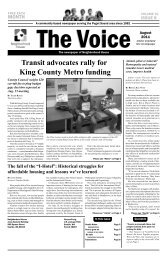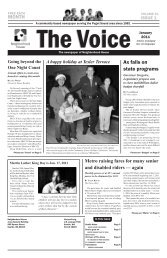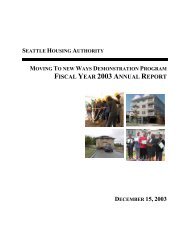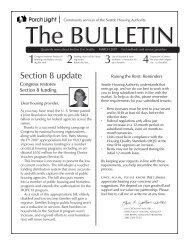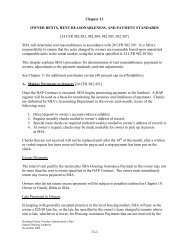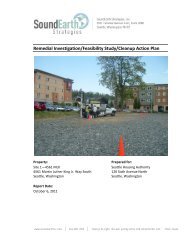December 2008 - Seattle Housing Authority
December 2008 - Seattle Housing Authority
December 2008 - Seattle Housing Authority
Create successful ePaper yourself
Turn your PDF publications into a flip-book with our unique Google optimized e-Paper software.
PorchLight<br />
Community services of the <strong>Seattle</strong> <strong>Housing</strong> <strong>Authority</strong><br />
The Bulletin<br />
News about the SHA <strong>Housing</strong> Choice Voucher program <strong>December</strong> <strong>2008</strong> Published quarterly for landlords and service providers<br />
1 2 3<br />
Our mission only begins<br />
with providing housing;<br />
about other programs<br />
Voucher program update<br />
Providing good, safe<br />
housing is just part of<br />
our mission<br />
Dear housing provider,<br />
October workshop a<br />
success; February workshop<br />
scheduled<br />
as our name implies, the chief purpose of<br />
<strong>Seattle</strong> <strong>Housing</strong> <strong>Authority</strong> is to provide housing.<br />
We do so through the <strong>Housing</strong> Choice Voucher<br />
program (Section 8), and also through our Low<br />
Income Public <strong>Housing</strong> program, the <strong>Seattle</strong><br />
Senior <strong>Housing</strong> program, and our Impact Property<br />
Management program, which administers<br />
the family communities of High Point, NewHolly,<br />
Rainier Vista and other properties.<br />
But <strong>Seattle</strong> <strong>Housing</strong> <strong>Authority</strong> does more than<br />
provide housing for our participants and tenants.<br />
Our mission statement is “to enhance the <strong>Seattle</strong><br />
community by creating and sustaining decent,<br />
safe and affordable living environments that foster<br />
stability and self-sufficiency for people with low<br />
incomes.”<br />
To foster their stability and self-sufficiency,<br />
we offer participants in the Section 8 program a<br />
number of programs.<br />
One of them is the Family Self-Sufficiency program<br />
(FSS), which offers participants the opportunity<br />
to set five year goals for themselves and links<br />
them with supportive services in order to help<br />
them overcome challenges and obstacles such<br />
as transportation, credit, childcare, etc. that may<br />
prevent them from reaching those goals. The<br />
FSS program also provides monthly deposits into<br />
an escrow account for participants that increases<br />
based on increases in their earned income and<br />
rent. Participants may withdraw funds from their<br />
escrow account while they are in the program to<br />
Fair <strong>Housing</strong><br />
questions & answers<br />
for landlords<br />
4<br />
Inspector’s Corner:<br />
Dealing with infestations<br />
of bedbugs<br />
assist them in accomplishing their goals (e.g., for car<br />
repairs, tuition, home ownership, and the like).<br />
Another program is The Job Connection, which<br />
exists “to empower residents to be actively involved<br />
in their own neighborhoods, to establish a strong<br />
network of partnerships, to value neighbors’ cultural<br />
diversity, and to be educated and motivated<br />
to improve their own lives.” The Job Connection<br />
helps people achieve their employment goals,<br />
beginning with an assessment of their interests and<br />
their skills. With the assistance and guidance of<br />
trained employment counselors, each participant<br />
identifies and develops his or her own individual<br />
goals and develops a plan to meet his or her employment<br />
needs. Job Connection counselors help<br />
people prepare résumés and assist them in arranging<br />
and preparing for interviews with prospective<br />
employers and in obtaining jobs. From the period<br />
of January through October, <strong>2008</strong>, Job Connection<br />
staff services resulted in 188 job placements, with<br />
an average hourly wage of $14.06; 86 percent of<br />
these jobs have benefits. Job Connection counselors<br />
also assist participants in planning for and attaining<br />
career advancement once they’ve landed a job.<br />
These and other programs are described in detail<br />
on our website, www.seattlehousing.org (under<br />
“Residents”). I urge you to learn about these programs<br />
and, where appropriate, to refer your tenants<br />
to them for assistance.<br />
thank you once again for participating in the<br />
<strong>Housing</strong> Choice Voucher program. As always, if<br />
you have any questions or concerns, please don’t<br />
hesitate to call me.<br />
lisa cipollone-wolters<br />
director of housing advocacy<br />
and rental assistance programs<br />
206-239-1523<br />
<strong>Seattle</strong> <strong>Housing</strong> <strong>Authority</strong>’s PorchLight <strong>Housing</strong> Center • 907 NW Ballard Way, Suite 200 • <strong>Seattle</strong> WA 98107-4637 • porchlight.info@seattlehousing.org
PAGE 2<br />
Training for landlords<br />
PorchLight again hosts daylong<br />
landlord workshop on protecting<br />
investments, preventing crime<br />
o n octo b e r 21, at PorchLight, <strong>Seattle</strong> <strong>Housing</strong> hosted<br />
a landlord training by the <strong>Seattle</strong> Neighborhood Group.<br />
This training, which we also hosted last year, helps<br />
landlords protect their investments by learning proven<br />
techniques and strategies to screen applicants, create<br />
strong rental agreements, resolve problems early, prevent<br />
illegal activity, build a strong community and avoid costly<br />
evictions.<br />
Ron Oldham, former SHA deputy director and<br />
<strong>Seattle</strong> landlord, discussed crafting a business plan<br />
for investment property, the importance of carefully<br />
screening tenants, writing a good lease, and, most<br />
importantly, “d w y s y w d: Do What You Said You Would<br />
Do.” As a property owner, he said, “if you have a tenant<br />
who is causing problems or failing to pay rent, prompt<br />
action in compliance with the law and your lease is<br />
imperative to regaining control and preventing more<br />
serious problems down the line.”<br />
Kelly McKinney of SNG presented information about<br />
Crime Prevention Through Environmental Design<br />
(CPTED)—that is, design that clearly delineates public<br />
from private areas to prevent people who don’t belong<br />
on your property from hanging out and possibly engaging<br />
in illegal or undesirable activity. Sita Degiulio Das, <strong>Seattle</strong><br />
Neighborhood Group, spoke about the possibilities of<br />
crime prevention through community organizing: By<br />
making sure your tenants know the neighbors and vice<br />
versa, you can help create a community that discourages<br />
illegal activity. Detective Gary Kinner from the <strong>Seattle</strong><br />
Police Department narcotics unit let participants know<br />
what to watch out for when they suspect tenants may be<br />
engaged in drug-related criminal behavior. He noted the<br />
importance of being proactive.<br />
Finally, Chris Benis, legal counsel to the Rental<br />
<strong>Housing</strong> Association of Puget Sound, hammered home<br />
the importance of doing thorough background checks,<br />
entering into solid leases, and documenting problems in<br />
writing. “If your tenant is causing problems but there’s<br />
nothing in the lease that prevents them from doing what<br />
they’re doing, you will have a hard time getting them to<br />
change their behavior,” Benis said. “If your lease is solid<br />
and your rules are clear and you enforce them, you’ll be<br />
able to evict a problem tenant or get them to comply.”<br />
The 18 attendees learned the ins and outs of applicant<br />
screening including Fair <strong>Housing</strong> issues, background<br />
checks and references, warning signs, best practices<br />
for reviewing rental agreements, and requirements for<br />
denying applicants. They also discussed the essentials of<br />
rental agreements, ongoing management, crime prevention<br />
employing natural surveillance and other methods,<br />
december <strong>2008</strong><br />
Every third Tuesday,<br />
February through November,<br />
from 5:30 until 7:00 p.m.<br />
Tuesday, February 17<br />
Fair <strong>Housing</strong> for<br />
Section 8 Landlords<br />
Questions? Ideas for workshops?<br />
Contact Mike Jung, Owner Liaison, at<br />
mjung@seattlehousing.org<br />
or 206-239-1672<br />
THE BULLETIN<br />
warning signs of drug activity and gang activity, eviction<br />
and working with law enforcement, and the benefits of<br />
working with the <strong>Housing</strong> Choice Voucher program.<br />
Participants received a guide including resources for<br />
dealing with these and other issues involving rental property<br />
and tenants. They also got to ask a lot of questions<br />
and share their experiences. Mike Jung, Owner Liaison<br />
for the SHA Voucher program, said of the Q & A, “Getting<br />
some of the facts is a good starting point, but when<br />
we hear from landlords about their actual experiences,<br />
it always amazes me how often someone else attending<br />
the training has been in a similar situation, and how<br />
together with the experts people can formulate a plan of<br />
action to deal with nearly any situation.”<br />
☛ If you missed the October 21 workshop but you’re interested<br />
in this training, there will be one more session this year<br />
on Thursday, <strong>December</strong> 4. To register or learn more, go to<br />
www.sngi.org/landlord.html or call Lois at 206-323-3150.<br />
Landlord Tuesday workshops<br />
Learn about the rights & responsibilities<br />
of residential property managers<br />
from veteran civil rights analysts<br />
JT Delich and Chenelle Love of the<br />
<strong>Seattle</strong> Office for Civil Rights<br />
· Fair <strong>Housing</strong> overview<br />
· Fair <strong>Housing</strong> & the application process<br />
· Fair <strong>Housing</strong> & advertising<br />
· Resources for landlords<br />
Bring your questions & concerns!<br />
from 5:30 until 7:00 p.m. at the<br />
<strong>Seattle</strong> <strong>Housing</strong> <strong>Authority</strong><br />
PorchLight Community Room<br />
907 NW Ballard Way, Suite 200 :: <strong>Seattle</strong> WA 98107<br />
<strong>Seattle</strong> <strong>Housing</strong> <strong>Authority</strong>’s PorchLight <strong>Housing</strong> Center • 907 NW Ballard Way, Suite 200 • <strong>Seattle</strong> WA 98107-4637 • porchlight.info@seattlehousing.org
The Bulletin<br />
Keeping clear of Fair <strong>Housing</strong> issues<br />
december <strong>2008</strong> Page 3<br />
Best leave mention of the church out of the ad<br />
Is it O.K. for manager Joe Thomas to advertise his<br />
rental apartment this way? “One bedroom unit.<br />
Ideal for mature person. Quiet neighborhood, many<br />
amenities. Close to St. Martin’s Church.”<br />
Under Fair <strong>Housing</strong> laws, it is not legal to advertise any<br />
preference for or against a “protected class” of persons.<br />
Here’s what the federal Fair <strong>Housing</strong> Act (FHA) says about<br />
advertising:<br />
It shall be unlawful to make, print or<br />
publish, or cause to be made, printed<br />
or published, any notice, statement or<br />
advertisement with respect to the sale or<br />
rental of a dwelling which indicates any<br />
preference, limitation or discrimination<br />
because of race, color, religion, sex,<br />
handicap, familial status, or national<br />
origin, or an intention to make any such<br />
preference, limitation or discrimination.<br />
In <strong>Seattle</strong>, protected classes include race,<br />
color, national origin, religion/creed, sex,<br />
disability, parental status, marital status,<br />
sexual orientation, gender identity, age,<br />
political ideology—and whether or not<br />
one has or will have a <strong>Housing</strong> Choice<br />
(Section 8) voucher.” (See a complete list<br />
at www.metrokc.gov/dias/ocre/FHlaws.htm.)<br />
Because ads that designate the type of tenant desired<br />
can often cross the line into stating a preference for or<br />
limitation against certain groups, be sure to use caution<br />
when using advertising.<br />
For example, most prospective tenants will assume that<br />
“mature person” means that manager Thomas is looking<br />
for a single tenant or a retiree, and that he does not want<br />
families with children.<br />
Also, while it’s fine to refer to landmarks, using a<br />
landmark such as St. Martin’s Church could be construed<br />
as implying a preference for members of that church.<br />
Consider using advertising that alerts home-seekers to<br />
the size and location of the unit, the monthly rental price,<br />
and any features that make the unit desirable, such as<br />
included utilities, laundry room, pool, etc. This will assist<br />
a prospective tenant in matching his or her needs with<br />
your openings.<br />
Manager Thomas should think about limiting<br />
his advertising to,“One-bedroom unit. Quiet<br />
neighborhood, many amenities,” and maybe expand on<br />
those amenities.<br />
Keep in mind that even if your rental property is<br />
“Keep in mind<br />
that even if your<br />
rental property is<br />
exempt from the<br />
Fair <strong>Housing</strong> Act<br />
because you do not<br />
own four properties,<br />
the FHA covers all<br />
advertisements.”<br />
exempt from the Fair <strong>Housing</strong> Act because you do not<br />
own four properties, the FHA covers all advertisements<br />
(and City of <strong>Seattle</strong> Fair <strong>Housing</strong> laws may apply where<br />
the owner has fewer properties). The advertising rules<br />
apply to all written notices or oral statements by anyone<br />
engaged in the sale or rental of a dwelling. Written<br />
notices and statements include applications, flyers,<br />
brochures, deeds, signs, banners, posters, billboards or<br />
any documents used in the sale or rental<br />
process.<br />
For an online list of words that you<br />
should avoid in ads, see www.metrokc.<br />
gov/dias/ocre/advertise.htm.<br />
* * *<br />
A gay couple who applies for rental of<br />
a one-bedroom apartment in <strong>Seattle</strong><br />
meets and exceeds the rental criteria<br />
established by property manager Jill<br />
Greene. Greene tells them she’s sorry,<br />
but she cannot rent the advertised<br />
one-bedroom unit to them and tells<br />
them that they must instead wait for<br />
an available two-bedroom apartment.<br />
Does her saying so violate Fair <strong>Housing</strong> laws?<br />
The federal Fair <strong>Housing</strong> Act does not cover sexual<br />
orientation or marital status as protected classes, but<br />
City of <strong>Seattle</strong> housing ordinances do. So, since the<br />
apartment is in <strong>Seattle</strong>, manager Greene should have let<br />
the gay couple make their own choice of unit.<br />
In <strong>Seattle</strong>, Fair <strong>Housing</strong> laws do not allow a housing<br />
provider to base rental or sales decisions on a person’s<br />
sexual orientation or marital status. “Sexual orientation”<br />
is generally defined as including male or female<br />
heterosexuality, bisexuality, or homosexuality, and<br />
includes a person’s attitudes, preferences, beliefs, and<br />
practices pertaining to sex (but does not include conduct<br />
that is a public or private nuisance or is unlawful under<br />
county, state, or federal law). “Marital status” is usually<br />
defined as including people who are single, married,<br />
separated, engaged, widowed, divorced or (in some<br />
jurisdictions) cohabitating.<br />
In the same way that you don’t (and cannot) consider<br />
an applicant’s race or religion in the rental decision,<br />
sexual orientation or marital status cannot be used as<br />
criteria.<br />
—Courtesy King County Office of Civil Rights<br />
<strong>Seattle</strong> <strong>Housing</strong> <strong>Authority</strong>’s PorchLight <strong>Housing</strong> Center • 907 NW Ballard Way, Suite 200 • <strong>Seattle</strong> WA 98107-4637 • porchlight.info@seattlehousing.org
The Bulletin<br />
The Bulletin<br />
Inspector’s corner<br />
december <strong>2008</strong> Page 4<br />
Page 3<br />
Bedbugs bugging your tenants? Tenants bugging you?<br />
When bedbugs make their unwelcome appearance, as they are doing<br />
with increasing frequency in Puget Sound, it’s not uncommon for a<br />
tenant to blame the landlord and vice-versa. But trying to identify<br />
who is chiefly at fault for an infestation is often impossible to do, and<br />
in any case simply postpones the solution, which is to seek out a pestcontrol<br />
professional right away.<br />
Bedbugs, Cimex lectularius, are small wingless insects that feed<br />
solely upon the blood of warm-blooded animals. While many people<br />
associate bedbugs with poor hygiene and housecleaning, such<br />
conditions do not have to exist for infestations to occur. Bedbugs<br />
typically come into a home as hitchhikers on previously used items,<br />
such as mattresses, bed frames, and even desks and dressers.<br />
Bedbugs seek out people and animals, generally at night while<br />
these hosts are asleep, and painlessly sip a few drops of blood.<br />
While feeding, they inject a tiny amount of their saliva into the skin.<br />
Repeated exposures to bed bug bites during a period of several<br />
weeks or more causes people to become sensitized to the saliva<br />
of these bugs; additional bites may then result in mild to intense<br />
allergic responses. The skin lesion produced by the bite of a bedbug<br />
resembles those caused by many other kinds of blood-feeding insects,<br />
such as mosquitoes and fleas. The offending insect, therefore,<br />
can rarely be identified by the appearance of the bites. A physician<br />
should be consulted to rule out other causes for the lesions and to<br />
offer treatment, as needed. The affected person should resist the<br />
urge to scratch the bites, as this may intensify the irritation and itching,<br />
and may lead to secondary infection. Fortunately, bedbugs are<br />
not known to transmit any infectious agents.<br />
Bedbugs are slightly smaller than ¼ inch long, rather round or<br />
oval, and are rusty red to mahogany in color; they become redder<br />
after feeding. The host’s blood may appear as a dark red or black<br />
mass within the bug’s body. Because they never develop wings,<br />
bedbugs cannot fly. When disturbed, bedbugs actively seek shelter<br />
in dark cracks and crevices.<br />
Cast skins of bedbugs are sometimes found. Although such a<br />
finding confirms that bedbugs had been present previously, it does<br />
not confirm that any continue to infest the residence. Thus, inspect<br />
carefully for live crawling bed bugs. Because many other kinds of<br />
small brown bugs may be discovered, it is critical to ensure that the<br />
bugs are correctly identified.<br />
If bedbugs are definitely determined to be in a home, it is advisable<br />
to hire the services of a reputable pest control operator. Be sure<br />
that the pest control operator you hire has experience with bedbugs;<br />
it is not sufficient to use an all-purpose pesticide.<br />
Before a pest control operator comes to the property, the tenant<br />
should be asked to remove all clutter to aid the operator’s work.<br />
A good online resource about bedbugs is www.hsph.harvard.<br />
edu/bedbugs/, from which much of this was taken. Locally, there’s<br />
good information on the Public Health <strong>Seattle</strong> & King County website,<br />
www.kingcounty.gov/healthservices/health; search for “bedbugs.”<br />
—Paul Gimme, <strong>Housing</strong> Quality Standards Inspector<br />
PorchLight<br />
Phone: 206-239-1500 | Fax: 206-239-1770<br />
E-mail: porchlight.info@seattlehousing.org | website: www.seattlehousing.org<br />
general questions<br />
To speak with a customer service agent<br />
about any <strong>Housing</strong> Choice Voucher program<br />
issue, call 206-239-1728 and press ‘0’<br />
TO LIST AVAILABLE UNITS<br />
Call 206-239-1663 or go to<br />
www.seattlehousing.org and click on “Section<br />
8 Landlords” under the ‘<strong>Housing</strong>’ menu<br />
OWNER INFORMATION<br />
note: Changes must be submitted in writing<br />
Fax 206-239-1770, attention Mike Jung.<br />
Questions? Call Mike at 206-239-1672<br />
housing choice voucher program<br />
MANAGER Barbara Strayer 206-239-1620<br />
owner liaison<br />
Mike Jung 206-239-1672<br />
Occupancy supervisors<br />
Tenant-based—<br />
“Aa” through “Lara” 206-239-1619<br />
“Larb” through “Zz” 206-239-1636<br />
Mod. Rehab. & Project-based 206-239-1649<br />
new move-in team<br />
Status of tenancy approvals—<br />
contracts and leases<br />
“Aa” through “Lara” 206-239-1676<br />
“Larb” through “Zz” 206-239-1635<br />
New move-ins fax number 206-239-1760<br />
New move-in team supervisor 206-239-1621<br />
INSPECTIONS<br />
Annual inspections & reinspections<br />
206-239-1645<br />
New move-in inspections—<br />
“Aa” through “Lara” 206-239-1676<br />
“Larb” through “Zz” 206-239-1635<br />
Judy Huertas, HQS supervisor 206-239-1621<br />
<strong>Housing</strong> quality standards inspectors<br />
Bill Francis 206-721-1457, ext. 10<br />
Paul Gimmi 206-239-1632<br />
Sue Nigg 206-239-1639<br />
Jonathan Shibuya 206-239-1616<br />
Jason Shirley 206-239-1646<br />
Nancy Shutes 206-770-6880<br />
Lora Wait-Hoy 206-721-1457, ext. 11<br />
What is PorchLight?<br />
PorchLight <strong>Housing</strong> Center is a division of the <strong>Seattle</strong><br />
<strong>Housing</strong> <strong>Authority</strong>, the city’s largest provider of lowincome<br />
and affordable housing. PorchLight manages the<br />
<strong>Housing</strong> Choice Voucher program and applications for<br />
public housing.<br />
Did you know...<br />
…that owners can find support on our website?<br />
Visit www.seattlehousing.org today and click on<br />
“Landlords”for helpful information and resources.<br />
...that SHA’s Impact Property Services provides lead-based<br />
paint abatement services? Impact Property Services offers<br />
affordable, efficient service to help solve your deteriorated<br />
paint problems. We can provide both EPA-certified leadbased<br />
paint risk assessors and EPA-certified lead-safe workers,<br />
including painters and carpenters. Call Impact Property<br />
Services at 206-716-1310, extension 13.<br />
…that the City of <strong>Seattle</strong> provides free information<br />
about property owners’ rights and city ordinances? Call<br />
206-684-7979 for more information.<br />
the bulletin: Quarterly news about the <strong>Housing</strong> Choice Voucher program in <strong>Seattle</strong> december <strong>2008</strong>



